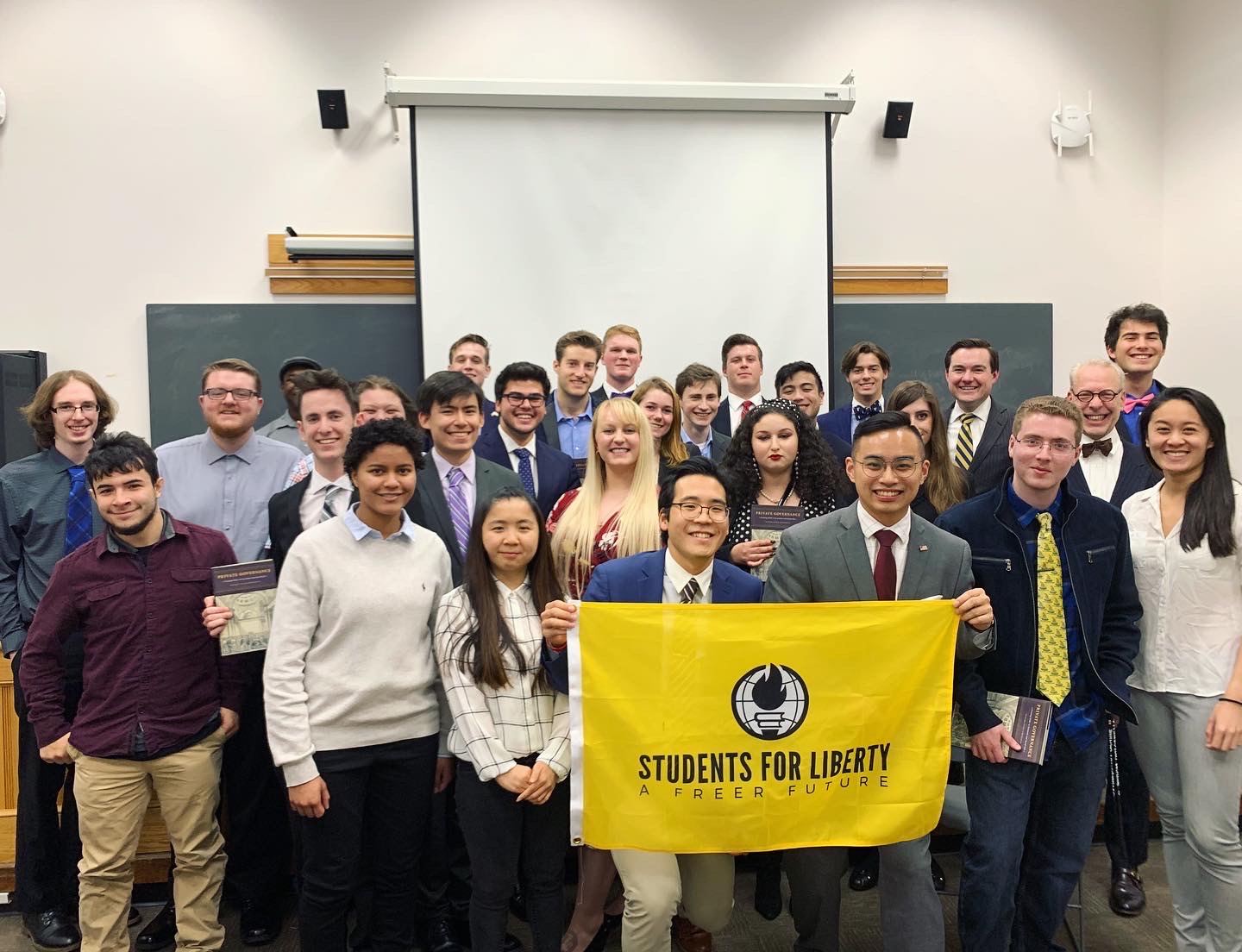Meet Ethan Yang: Speech First Member Spotlight
- “Students are pretty free to speak on campus; the problem is that they are not empowered to do so.”
- “Like most people, students like free speech when it benefits them. It takes a special type of person to valiantly stand up for speech they do not like.”
- “At elite New England private schools such as the ones here in Connecticut, most professors are overwhelmingly on one side of the political spectrum.”
- “Students should [be] firmly told that [a college campus] is not the place to silence conversations that they don’t like.”
Name: Ethan Yang
School: Trinity College- Hartford
Major: Political Science and Government
Q: Tell me about your work with Students for Liberty and how the group has been received on campus.
A: I am the northeast regional coordinator of Students for Liberty, which entails working with our local coordinators who lead student groups on campuses across the northeast region of the United States. At Trinity College, I am president and cofounder of a Young Americans for Liberty chapter. We seek to spread the ideas of libertarianism through a robust guest speaker series and fun activities like going to the shooting range. We also uphold core liberal arts values such as free speech, academic freedom, and diversity of thought.
Generally speaking, our presence has been respected but that doesn’t mean some people haven’t discriminated against us for our views. From flyers being ripped down to outright suggestions that there should be a special scrutiny process dedicated to controlling us, some people can’t seem to tolerate others’ opinions. One of my officers told me that his job as a resident assistant is in question because I posted a picture of us together at the shooting range. Our members have even been slandered by the student government president for exposing their unethical practices that trample students’ rights. We seek to break the orthodoxy and make Trinity a place where students can engage with all sorts of ideas and express themselves freely. Challenging the status quo will ensure that all students are treated with respect regardless of their beliefs.
Q: You also write for the student newspaper, The Trinity Tripod. Has this media outlet been a vehicle for free speech at Trinity? What kind of oversight does the school have over the paper?
A: The Trinity Tripod is certainly a vehicle for free speech as it contains all sorts of viewpoints and perspectives. The vice president of Trinity Young Americans for Liberty is the opinion editor and he is an ardent free speech warrior himself. I write practically every week in the Tripod and encourage my officers to flood the opinion section with libertarian and conservative articles. However, alongside our articles are robust opinions from the liberal ideology as well. It even has anonymous pieces written by Chinese international students who are trying to speak out against their Chinese government.
Recently we’ve had some outrage over an opinion piece making the case that Transwomen shouldn’t participate in women’s sports. It was well argued and civil in tone, but some students were incredibly offended. These same students are the usual culprits that always push anti-free speech sentiments, but this time they have momentum. They have new allies in positions of power on campus and there’s talk of disciplining students for expressing these types of views and others. We will see where this goes, but right now, the Tripod is under attack.
Q: Do speech policies at your school make it easier or more difficult for students to express their opinions? Give us some examples.
A: Students are pretty free to speak on campus; the problem is that they are not empowered to do so. That is because we do not have policies that affirm our rights to free speech nor are we encouraged to use them. There have been some instances of censorship in extreme cases. Our most famous case was when a liberal professor was under siege for some comments he made. The school gave into the mob of protestors and investigated the professor rather than defend him. In the end, they found he did nothing wrong. However, the administration needs to seriously take a stand for free speech and make assertive statements about free inquiry and expression. Students must be assured that their rights are protected and that attempts to militantly suppress those rights will be met with appropriate measures.
Recently my Asian American Student Association hosted a discussion about Kashmir, a controversial topic. Various student constituencies attempted to complain to the school’s administration, thankfully with only minor inconveniences to us. But those students should have been firmly told that this is not the place to be asking administrators to silence conversations that they don’t like.
Q: Are free speech supporters in the minority at your school? What are some unique challenges that students in Connecticut schools face when it comes to free speech issues?
A: Like most people, Trinity students like free speech when it benefits them. It takes a special type of person to valiantly stand up for speech they do not like. I think there is a broad understanding amongst most students that free expression is important, but they need to be reminded of its importance. More so they need to be educated on its nuances.
Generally speaking, I have met plenty of sensible people willing to listen to differing perspectives. However, there are also many students in positions of power or who are very vocal that do not respect free speech. These students go virtually unchallenged even though in private many people disagree with them. An example would be when the president of the student government sent out a mass email condemning a Trinity Tripod article as “Violent Transphobia.” I even overheard partisan liberals talking about how they thought that was an overreaction.
When it comes to Connecticut, the main challenge is that we do not have statewide free speech protections. Some states have passed bills like the FORUM Act which is a sweeping act of legislation that reaffirms the First Amendment at public universities and mandates proactive measures to protect free speech. At elite New England private schools such as the ones here in Connecticut, most professors are overwhelmingly on one side of the political spectrum, which I believe squeezes the window of acceptable discourse.
Q: What can we do to change the culture of censorship on college campuses across the country?
A: I think we need to be brave, but we also need to be empathetic. We must not forget that at one point many of the people who advocate for censorship now, a few decades ago roared like lions for free speech. Even today these same groups demand free speech but just not for other people. They can be reached if we show that we appreciate their rights to free expression and we will protect theirs the same as our own. Our arguments should be framed as means to promote their concerns, which requires genuine understanding of their issues. For example, we should be as excited to stand up for Black Lives Matter as we are for the College Republicans.
Obviously college administrators also need to show some spine and enact proactive policies to protect free expression. This includes enforcing the First Amendment, having orientation programs that teach the basics of free speech, actively promoting free speech instead of “safe spaces,” and punishing students who shut down others’ free speech. Students must be reminded that college is tough; one of the reasons why it’s tough is because you can be intellectually challenged. Instead of fearing that, they should take pride in it.
###
